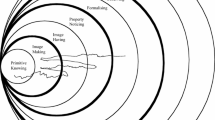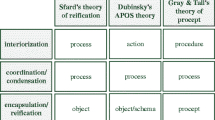Abstract
In this paper, we emphasize the methodological challenges of analyzing data with/in an enactivist framework in which (1) all knowing is doing is being, while focusing on, (2) how an entry by the observer transforms usual ways of analyzing data. In this sense, the association of knowing with doing suggests a shift in attention away from what students might “know” toward attending to the active, dynamic, enacted mathematical activity as knowing, bringing to bear the local and emergent character of the mathematical activity. In addition to illustrating data analysis along those lines, we discuss the methodological significances and challenges of, and paradigm shifts required for, replacing questions of knowledge and acquisition with ones that concern mathematical doing alone.



Similar content being viewed by others
Notes
We say “what has been termed enactivism” because there is no single main source for this discourse on cognition. In fact, one of the main sources of inspiration for people who call themselves enactivists is the work of Maturana. Ironically, we would be surprised if Maturana would accept being called an enactivist (for various reasons).
References
Barwell, R. (2009). Researchers’ descriptions and the construction of mathematical thinking. Educational Studies in Mathematics, 72(2), 255–269.
Brown, L. C., Coles, A. T., Lozano, M., & Reid, D. A. (2009). Researching the unsenseable? Implications for research methodology in enactivism. In M. Tzekaki, M. Kaldrimidou, & H. Sakonidis (Eds.), Proceedings of the PME33 conference (Vol. 1, pp. 265–270). Thessaloniki: Aristotle University of Thessaloniki and University of Macedonia.
Butlen, D., & Pézard, M. (1992). Calcul mental et résolution de problèmes multiplicatifs, une experimentation du CP en CM2. Recherches en didactique des mathématiques, 12, 319–368.
Châtelet, G. (1993). Les enjeux du mobile: Mathématique, physique, philosophie. Paris: Éditions du Seuil.
Coles, A. (2015). On enactivism and language: towards a methodology for studying talk in mathematics classrooms. ZDM—The International Journal on Mathematics Education, 47(2) (this issue). doi:10.1007/s11858-014-0630-y.
Davis, B. (2004). Inventions of teaching: a genealogy. Mahwah: Erlbaum.
Davis, A. B., Sumara, D. J., & Kieren, T. (1996). Cognition, co-emergence, curriculum. Journal of Curriculum Studies, 28(2), 151–169.
Davis, B., Sumara, D., & Luce-Kapler, R. (2008). Engaging minds: changing teaching in complex times (2nd ed.). New York: Routledge.
Heidegger, M. (1977). The age of the world picture. New York: Harper & Row.
Jarvis, S. (2004). What is speculative thinking? Revue internationale de philosophie, 1(227), 69–83. http://www.cairn.info/revue-internationale-de-philosophie-2004-1-page-69.htm. Accessed 25 September 2014.
Khan, S., Francis, K., & Davis, B. (2015). Accumulation of experience in a vast number of cases: enactivism as a fit framework for the study of spatial reasoning in mathematics education. ZDM—The International Journal on Mathematics Education, 47(2) (this issue). doi:10.1007/s11858-014-0623-x.
Kieren, T., Calvert, L.G., Reid, D.A., & Simmt, E. (1995). Coemergence: four enactive portraits of mathematics activity. Paper presented at the AERA. http://tiny.cc/KieranCalvert1995. Accessed 25 September 2014.
Kieren, T., & Simmt, H. (2009). Brought forth in bringing forth. Complicity, 6(2), 20–22.
Lozano, M-D. (2015). Using enactivism as a methodology to characterise algebraic learning. ZDM—The International Journal on Mathematics Education, 47(2) (this issue).
Maheux, J.-F. (2010). How do we know? An epistemological journey in the day-to-day, moment to-moment, of researching, teaching and learning in mathematics education. Unpublished doctoral dissertation, University of Victoria.
Maheux, J.-F., & Proulx, J. (2014). Vers le faire mathématique: essai pour un nouveau positionnement en didactique des mathématiques. Annales de didactique et de sciences cognitives, 19 (in press).
Maheux, J.-F., & Roth, W.-M. (2011). Relationality and mathematical knowing. For the Learning of Mathematics, 31(3), 36–41.
Maturana, H. (1988). Ontology of observing: the biological foundations of self-consciousness and the physical domain of existence. In Conference workbook: texts in cybernetics theory, conference workbook. Felton: ASC.
Maturana, H. (1988b). Reality: the search for objectivity or the quest for a compelling argument. Irish Journal of Psychology, 9(1), 25–82.
Maturana, H. R., & Varela, F. J. (1992). The tree of knowledge: the biological roots of human understanding (Revised ed.). Boston: Shambhala.
Metz, M., & Simmt, E. (2015). Researching mathematical experience from the perspective of an empathic second-person observer. ZDM—The International Journal on Mathematics Education, 47(2) (this issue). doi:10.1007/s11858-014-0621-z.
Morss, J. R. (1990). The biologizing of childhood: developmental psychology and the Darwinian myth. Hillsdale: Erlbaum.
Pirie, S., & Kieren, T. (1994). Growth in mathematical understanding: how can we characterize it and how can we represent it? Educational Studies in Mathematics, 26(2–3), 165–190.
Proulx, J. (2013a). Mental mathematics, emergence of strategies, and the enactivist theory of cognition. Educational Studies in Mathematics, 84(3), 309–328.
Proulx, J. (2013b). Le calcul mental au-delà des nombres: conceptualisations et illustrations avec la résolution d’équations algébriques. Annales de didactique et de sciences cognitives, 18, 61–90.
Proulx, J. (2013). Mental mathematics and algebra equation solving. Proceedings of CERME-8, (pp. 530–539), Antalya, Turkey.
Proulx, J. (2014). From model-building to the observer. Constructivist Foundations, 9(3), 341–344.
Proulx, J., & Simmt, E. (2013). Enactivism in mathematics education: moving toward a re-conceptualization of learning and knowledge. Education Sciences and Society, 4(1), 59–79.
Radford, L. (2013). Three key concepts of the theory of objectification: knowledge, knowing, and learning. REDIMAT, 2(1), 7–44.
Radford, L. (2014). Towards an embodied, cultural, and material conception of mathematics cognition. ZDM—The International Journal on Mathematics Education, 349–361.
Reid, D.A. (1996). Enactivism as a methodology. Proceedings of PME-20 (Vol. 4, pp. 203–210). Valencia: PME.
René de Cotret, S. (1999). Perspective bio-cognitive pour l’étude des relations didactiques. In G. Lemoyne & F. Conne (Eds.), Le cognitif en didactique des mathématiques (pp. 103–120). Montréal: Presses de l’Université de Montréal.
Rogalski, J. (2003). Y a-t-il un pilote dans la classe? Une analyse de l’activité de l’enseignant comme gestion d’un environnement dynamique ouvert. Recherches en didactique des mathématiques, 23(3), 343–388.
Roth, W. M. (2011). Geometry as objective science in elementary school classrooms: Mathematics in the flesh. New York: Routledge.
Roth, W.M., & Maheux, J.F. (2014). The stakes of movement: a dynamic approach to mathematical thinking. Curriculum Inquiry (in press).
Siegler, R. S. (1996). Emerging minds: the process of change in children’s thinking. New York: Oxford University Press.
Simon, R. (1985). A frog’s eye view of the world. Structure is destiny: an interview with Humberto Maturana. Family Therapy Networker, 9(3), 32–37 (41–43).
Steffe, L. P., & Thompson, P. W. (2000). Interaction or intersubjectivity?: a reply to Lerman. Journal for Research in Mathematics Education, 31, 191–209.
Steinbring, H. (2015). Mathematical interaction shaped by communication, epistemological constraints and enactivism. ZDM—The International Journal on Mathematics, 47(2) (this issue). doi:10.1007/s11858-014-0629-4.
Thom, J. S., Roth, W. M., & Bautista, A. (2010). In the flesh: living growing conceptual domains in a geometry lesson. Complicity, 7(1), 77–87.
Varela, F.J. (1984). The creative circle: sketches on the natural history of circularity. In P. Watzlawick (Ed.), The invented reality. How do we know what we know? Contributions to constructivism (pp. 309–323). New York: Norton.
Varela, F. J. (1999). Ethical know-how: action, wisdom, and cognition. Stanford: Stanford University Press.
Varela, F. J., Thompson, E. T., & Rosch, E. (1991). The embodied mind: cognitive science and human experience. Cambridge: MIT Press.
von Glasersfeld, E. (1995). Radical constructivism: a way of knowing and learning. London: Falmer.
von Glasersfeld, E. (1997). Distinguishing the observer: an attempt at interpreting Maturana. http://www.oikos.org/vonobserv.htm. Accessed 25 September 2015.
Zack, V., & Reid, D. A. (2003). Good-enough understanding: theorizing about the learning of complex ideas (part 1). For the Learning of Mathematics, 23(3), 43–50.
Zack, V., & Reid, D. A. (2004). Good enough understanding: theorizing about the learning of complex ideas (part 2). For the Learning of Mathematics, 24(1), 24–28.
Author information
Authors and Affiliations
Corresponding author
Rights and permissions
About this article
Cite this article
Maheux, JF., Proulx, J. Doing|mathematics: analysing data with/in an enactivist-inspired approach. ZDM Mathematics Education 47, 211–221 (2015). https://doi.org/10.1007/s11858-014-0642-7
Accepted:
Published:
Issue Date:
DOI: https://doi.org/10.1007/s11858-014-0642-7




